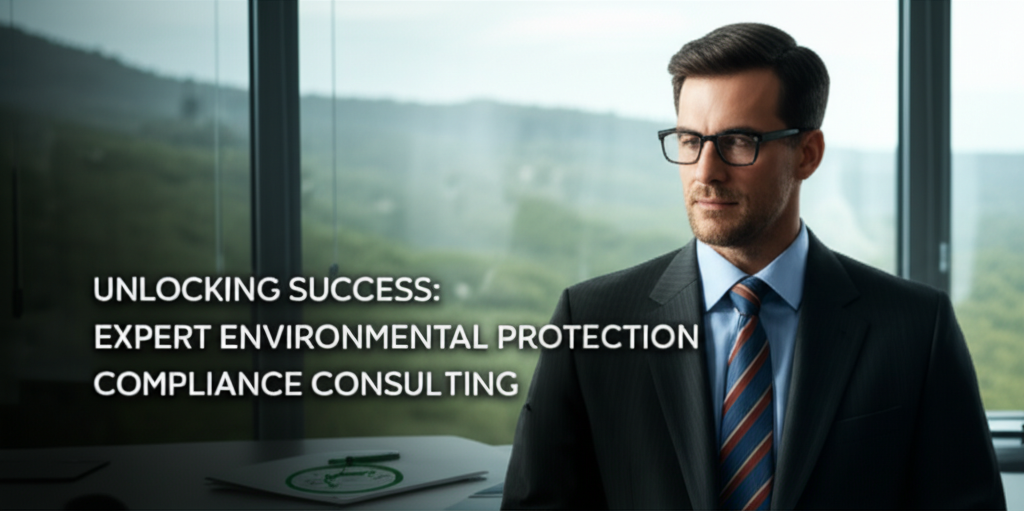Imagine standing at the forefront of a movement that’s not just about following regulations but actively shaping a sustainable future. This is the essence of environmental protection compliance consulting in Australia. As businesses increasingly recognize the importance of sustainability, the demand for expert guidance in navigating the complex landscape of environmental regulations has surged. If you’re curious about how compliance consulting can unlock success for organizations while benefiting our planet, you’re in the right place.
In this article, we will explore the critical components of environmental compliance consulting, its benefits, and practical applications. You’ll learn how effective consulting can help businesses not only meet legal requirements but also enhance their reputation, reduce risks, and contribute positively to the environment. We’ll also delve into real-world examples and case studies that illustrate these concepts in action. By the end of this journey, you will have a comprehensive understanding of how expert environmental protection compliance consulting can be the key to unlocking success in today’s eco-conscious world.
Understanding Environmental Protection Compliance Consulting
So, what exactly is environmental protection compliance consulting? At its core, it involves helping organizations adhere to environmental laws and regulations while also developing sustainable practices. This can encompass a wide range of areas, including waste management, emissions control, resource conservation, and environmental impact assessments.
The primary role of environmental consultants is to ensure that businesses not only comply with existing laws but also anticipate future regulations and potential challenges. This is essential in Australia, where environmental legislation is continually evolving to address pressing issues like climate change, biodiversity loss, and pollution.
The Regulatory Landscape in Australia
Australia has a complex regulatory framework governing environmental protection. The primary legislation includes the Environment Protection and Biodiversity Conservation Act 1999 (EPBC Act), which aims to protect the environment, native species, and ecological communities. Additionally, each state and territory has its own set of regulations, making it crucial for organizations to have a thorough understanding of both national and local laws.
In this intricate web of regulations, environmental consultants play a pivotal role. They help businesses navigate these laws, ensuring compliance and minimizing risks associated with non-compliance, which can include hefty fines and reputational damage.
Key Components of Environmental Protection Compliance Consulting
Now that we have a foundation, let’s dive into the key components of environmental protection compliance consulting. Understanding these elements will help you appreciate the multifaceted role consultants play in fostering sustainable business practices.
1. Environmental Audits
One of the first steps in compliance consulting is conducting environmental audits. These thorough assessments evaluate an organization’s current practices against regulatory requirements. Audits help identify gaps in compliance, areas for improvement, and potential risks.
Benefits of Environmental Audits:
- Detecting compliance issues before they escalate.
- Enhancing operational efficiency through optimized resource use.
- Providing a clear roadmap for sustainability initiatives.
2. Risk Assessment and Management
Understanding environmental risks is crucial for any business. Consultants conduct risk assessments to identify potential environmental impacts associated with operations. This process not only helps in compliance but also in developing mitigation strategies that protect both the environment and the business.
Key Steps in Risk Assessment:
- Identifying potential environmental hazards.
- Evaluating the likelihood of occurrence and potential impact.
- Developing strategies to manage and mitigate these risks.
3. Training and Capacity Building
Compliance isn’t just about following rules; it’s about fostering a culture of sustainability within an organization. Environmental consultants often provide training programs for employees, equipping them with the knowledge and skills needed to implement sustainable practices effectively.
Training Topics May Include:
- Understanding environmental regulations.
- Best practices for waste management.
- Strategies for reducing carbon footprints.
4. Reporting and Documentation
Accurate record-keeping is a cornerstone of compliance. Consultants assist organizations in developing robust reporting mechanisms that track environmental performance and compliance status. This documentation is vital for audits and regulatory inspections.
Common Reporting Requirements:
- Environmental impact assessments.
- Compliance reports to regulatory bodies.
- Public sustainability reports.
Benefits and Importance
Now that we’ve unpacked the components of environmental compliance consulting, let’s explore the benefits and importance of these services. Understanding why compliance consulting is essential can help you appreciate its value to businesses and the environment.
1. Legal Compliance and Risk Mitigation
One of the most significant benefits of engaging with environmental compliance consultants is ensuring legal compliance. Non-compliance can lead to severe penalties, including fines and legal action. By proactively working with consultants, businesses can mitigate these risks effectively.
2. Enhanced Reputation and Brand Value
In today’s eco-conscious market, consumers are increasingly favoring brands that demonstrate a commitment to sustainability. By prioritizing compliance and environmental responsibility, businesses can enhance their reputation, build customer loyalty, and differentiate themselves in the marketplace.
3. Cost Savings and Operational Efficiency
Surprisingly, compliance can lead to significant cost savings. By optimizing resource use and reducing waste, organizations can lower operational costs. Furthermore, effective waste management and resource conservation can lead to enhanced efficiency across all levels of operations.
4. Access to Funding and Investment Opportunities
Many investors are now considering environmental sustainability as a critical factor in their decision-making processes. Businesses that comply with environmental regulations and demonstrate sustainable practices are more likely to attract investment. This can open doors to new funding opportunities and partnerships.
Practical Applications
Let’s dive into some real-world applications of environmental protection compliance consulting. Understanding how these principles apply in practice can provide valuable insights into their effectiveness.
Case Study 1: Mining Industry Compliance
The mining sector in Australia is heavily regulated due to its significant environmental impact. A mining company engaged an environmental consultant to conduct a comprehensive audit of its operations. The audit revealed several areas of non-compliance regarding waste management and emissions reporting.
As a result, the consultant helped the company implement a waste reduction strategy, which included the recycling of materials and the reduction of toxic emissions. The company not only achieved compliance but also significantly reduced its operational costs and improved its public image.
Case Study 2: Manufacturing Sector Sustainability
In the manufacturing industry, a company sought to enhance its sustainability practices. Working with an environmental consultant, they conducted a thorough risk assessment that identified potential environmental hazards associated with their production processes.
With this information, the company developed a comprehensive sustainability plan that included energy-efficient technologies and waste reduction initiatives. The result was a 30% decrease in energy consumption and a substantial reduction in waste production, showcasing the effectiveness of compliance consulting in driving positive change.
Frequently Asked Questions
What is environmental protection compliance consulting?
Environmental protection compliance consulting involves assisting organizations in adhering to environmental regulations and implementing sustainable practices. This includes conducting audits, risk assessments, training, and developing reporting mechanisms to ensure compliance with local and national laws.
Why is compliance important for businesses?
Compliance is crucial for businesses to avoid legal penalties, enhance their reputation, and achieve operational efficiency. By adhering to environmental regulations, companies can also attract investors and build customer loyalty based on their sustainability practices.
How can environmental audits benefit my organization?
Environmental audits help identify compliance gaps and areas for improvement. They provide a roadmap for achieving sustainability goals and can lead to cost savings through optimized resource use and waste reduction. Regular audits can also help organizations stay ahead of regulatory changes.
What kind of training do consultants provide?
Consultants offer training programs that cover various aspects of environmental compliance, including understanding regulations, best practices for waste management, and strategies for reducing carbon footprints. These programs aim to foster a culture of sustainability within the organization.
How do I choose the right environmental consultant?
When selecting an environmental consultant, consider their experience, expertise, and track record in your industry. Look for consultants who offer tailored services that meet your specific needs and can demonstrate a clear understanding of the regulatory landscape relevant to your operations.
What are the costs associated with hiring an environmental consultant?
The costs of hiring an environmental consultant can vary widely depending on the scope of services required and the complexity of your operations. While there may be upfront costs, the long-term savings from compliance and improved efficiency often outweigh these initial expenses.
Conclusion
In conclusion, environmental protection compliance consulting is not just a necessity; it is an opportunity for businesses to thrive in an increasingly eco-conscious world. By understanding the key components, benefits, and real-world applications of compliance consulting, you can see how it plays a critical role in unlocking success.
As we move forward, the importance of environmental responsibility will only continue to grow. I encourage you to consider how your organization can benefit from expert consulting services. Whether you are a business owner, a decision-maker, or simply someone passionate about sustainability, embracing compliance can lead to a brighter, more sustainable future for all.
Let’s make a commitment to protect our environment while fostering business success. Are you ready to take the first step? Reach out to an environmental compliance consultant today and unlock the potential for a sustainable tomorrow!


